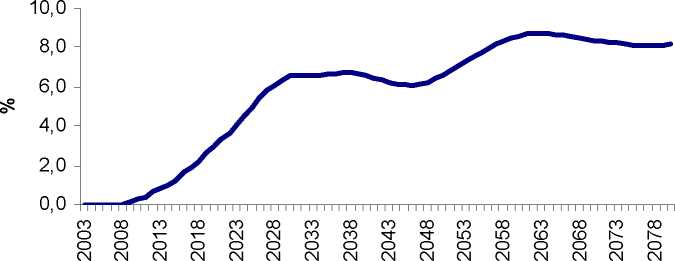set at 20%. Second, increasing labour supply by changing retirement schemes
is only of interest if it leads to more employment. It is a fact that there is
somewhat higher unemployment for elderly in the labour markets. Analyses
documented in Velfærdskommissionen (2005b,c) show that this is likely to be
driven by mechanisms on both the demand and supply side arising up to the
relevant horizon of labour market participation. Hence, by changing entitlement
ages, it is to be expected that there somewhat higher unemployment will remain,
but the age groups for which this prevails will be shifted upward along increases
in the retirement age.
The effects of the reforms on labour supply and public finances (primary
balance) are given in figure 9 and 10, respectively. The gradual introduction of
the changes implies that the immediate effects are modest. For the indexation
of the eligibility age for public pension the effect is moderate for a long period
since it takes time for the indexing to accumulate to a significant increase in
the "pension age". However, eventually both reform elements have substantial
effects. It is thus an important implication that a reform which does not change
the rules in the very short run and therefore fulfills the political criteria of a
gradual change in the entitlements of individuals leads to substantial effects
on the sustainability problem. Measured by the effect on labour supply and
employment the effect in 2040 is about 160.000 (an increase of 8 %), and for
the primary balance there is an improvement in 2040 of 2.1 percentage points
of GDP, and the sustainability problem is reduced by some 80%.
Figure 9: Retirement reform - labour supply effect

Note: Growth in labour force relative to base scenario
Source: Velfærdskommissionen (2005d)
The fact that the retirement reform only has marginal short run effects but
substantial effects over the medium to long run points to implications for policy
design. This is caused by the political constraint of avoiding sudden and abrupt
changes in entitlements . The credibility of the future changes are thus impor-
tant both from the perspective of individuals but also from a macroperspective.
25
More intriguing information
1. Nurses' retention and hospital characteristics in New South Wales, CHERE Discussion Paper No 522. EMU: some unanswered questions
3. The Impact of Optimal Tariffs and Taxes on Agglomeration
4. A Rare Presentation of Crohn's Disease
5. Wage mobility, Job mobility and Spatial mobility in the Portuguese economy
6. The name is absent
7. The name is absent
8. Altruism with Social Roots: An Emerging Literature
9. The Demand for Specialty-Crop Insurance: Adverse Selection and Moral Hazard
10. The technological mediation of mathematics and its learning